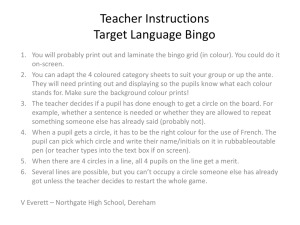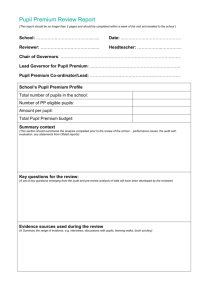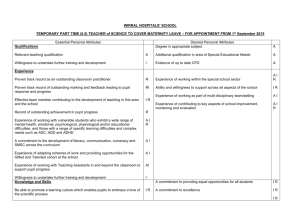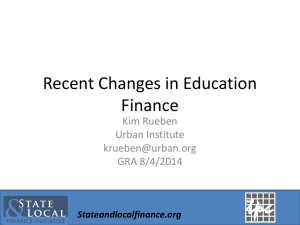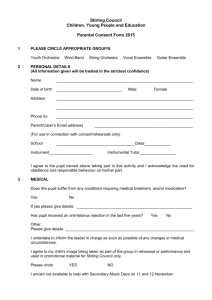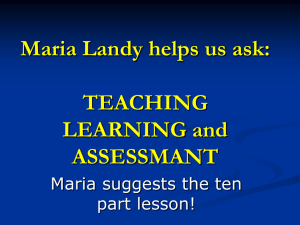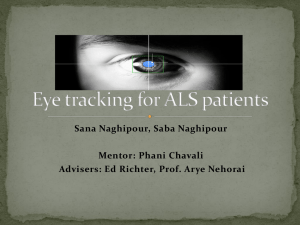Readiness scale for reintegrating children with social, emotional and
advertisement
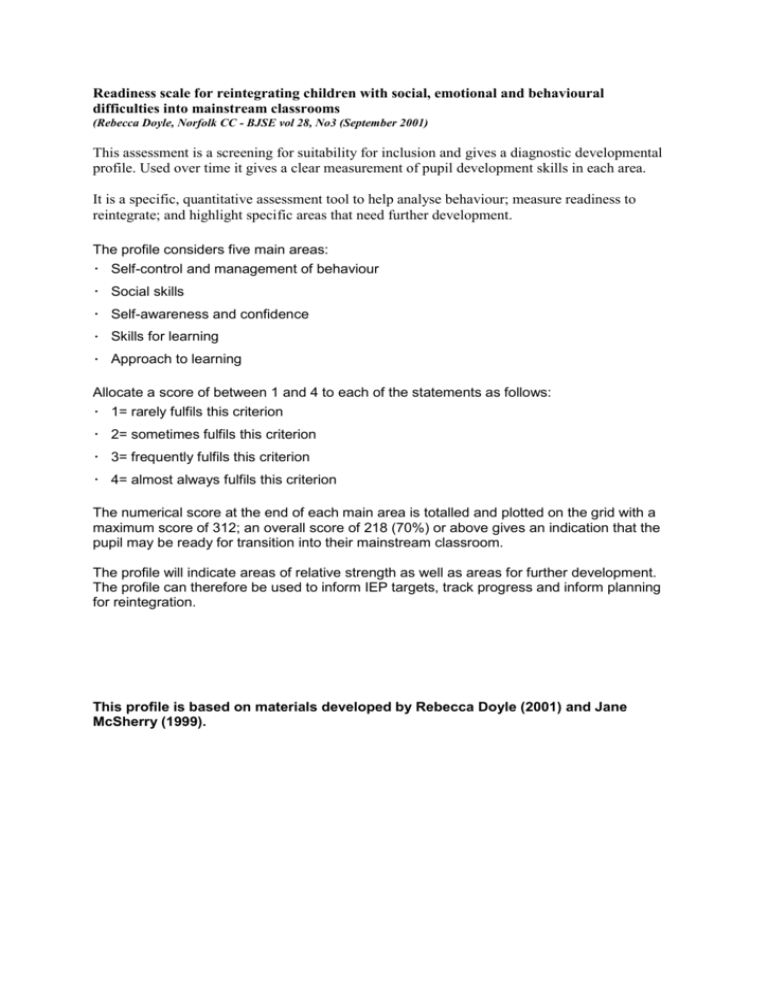
Readiness scale for reintegrating children with social, emotional and behavioural difficulties into mainstream classrooms (Rebecca Doyle, Norfolk CC - BJSE vol 28, No3 (September 2001) This assessment is a screening for suitability for inclusion and gives a diagnostic developmental profile. Used over time it gives a clear measurement of pupil development skills in each area. It is a specific, quantitative assessment tool to help analyse behaviour; measure readiness to reintegrate; and highlight specific areas that need further development. The profile considers five main areas: Self-control and management of behaviour Social skills Self-awareness and confidence Skills for learning Approach to learning Allocate a score of between 1 and 4 to each of the statements as follows: 1= rarely fulfils this criterion 2= sometimes fulfils this criterion 3= frequently fulfils this criterion 4= almost always fulfils this criterion The numerical score at the end of each main area is totalled and plotted on the grid with a maximum score of 312; an overall score of 218 (70%) or above gives an indication that the pupil may be ready for transition into their mainstream classroom. The profile will indicate areas of relative strength as well as areas for further development. The profile can therefore be used to inform IEP targets, track progress and inform planning for reintegration. This profile is based on materials developed by Rebecca Doyle (2001) and Jane McSherry (1999). 1. Self-Control and Management of Behaviour Can accept discipline without argument or sulking 1 2 3 4 Can arrive in classroom and settle down quietly and appropriately Does not leave the room without permission 1 2 3 4 1 2 3 4 Can accept changes to plans or disappointments with an even temper Shows some self-discipline when others try to encourage deviation Is aware of normal sound levels and can be reminded of them and respond appropriately Does not seek confrontation during unrestricted times e.g. break Behaves in socially acceptable manner in public e.g. outings Can maintain appropriate levels of behaviour when the classroom routine is disrupted Will abide by accepted rules of an organised game 1 2 3 4 1 2 3 4 1 2 3 4 1 2 3 4 1 2 3 4 1 2 3 4 1 2 3 4 Goes to and stays in designated areas when requested e.g. playground, hall, etc Controls emotions appropriately when faced with difficulties e.g. does not fight, strike out immediately, run away and hide or become excessively withdrawn 1 2 3 4 1 2 3 4 Behaves appropriately in all areas of the school building Score 1 2 3 4 /52 2. Social Skills Can cope with large numbers of people 1 2 3 4 Can accept that teacher time needs to be shared 1 2 3 4 Can ask a question and wait for the answer 1 2 3 4 Has appropriate communication skills e.g. asking questions and listening Can work alongside others in a group situation without disruption Interacts and plays in positive ways with peers 1 2 3 4 1 2 3 4 1 2 3 4 Apologises without reminder 1 2 3 4 Asks permission to use objects belonging to another person Shows empathy for and comforts playmates in distress Chooses own friends and maintains reciprocal friendships Makes and accepts normal physical contact with others Accommodates other children who ask to join in an activity Is self-reliant in managing own hygiene and basic needs Shows genuine interest in the news and activities of another child Contributes actively to play with two or more children Shows variation in the roles undertaken during cooperative play e.g. is not always in the rle of dominant character, etc Engages in appropriate conversation with another child, exchanging information and using appropriate dialogue Addresses adults and children appropriately by name and with eye contact Shares legitimately required equipment with another pupil Can take turns in question and answer sessions 1 2 3 4 1 2 3 4 1 2 3 4 1 2 3 4 1 2 3 4 1 2 3 4 1 2 3 4 1 2 3 4 1 2 3 4 1 2 3 4 1 2 3 4 1 2 3 4 1 2 3 4 Score /80 3. Self awareness and confidence Willing to ask for help 1 2 3 4 Can accept responsibility for actions without denial 1 2 3 4 Can acknowledge own problems and is willing to discuss them Can risk failure 1 2 3 4 1 2 3 4 States feelings about self, e.g. happy angry, sad, etc Maintains appropriate eye contact 1 2 3 4 1 2 3 4 Contributes to class discussions 1 2 3 4 Participates in group work, making constructive suggestions and adapting ideas Responds appropriately to stories, identifying the characters e.g. funny, kind, scary, bad, etc Participates in large class activities e.g. dance, role plays, performances, etc Accepts public praise and congratulation appropriately e.g. when good work is shown to peers, etc Shows pride in achievements and presentation of work 1 2 3 4 1 2 3 4 1 2 3 4 1 2 3 4 1 2 3 4 Has self-esteem for self 1 2 3 4 score /52 4. Skills for learning Can work alone without constant attention for brief periods Can attempt to listen to explanations and instructions and attempt to act on them Understands the structure of the day 1 2 3 4 1 2 3 4 1 2 3 4 Understands the role of the teacher and other adults in the room Understands the structure of discipline – what happens if he/she does not complete work, does not conform to playground rules etc Understands that there are different places for lessons other tha the classroom e.g. library, hall, etc and behaves appropriately Can constructively use unstructured time in the classroom Can organise him/herself if help is not immediately available Responds appropriately to personal request from teacher Will work alongside another pupil without attempting any distractions Can organise the materials needed for a task and clear them away appropriately Shows appropriate levels of curiosity when changes to the room routines are observed Reading and numeracy up to level that can be coped with in a mainstream classroom given reasonable support Shows a willingness to improve own literacy and numeracy Can read sufficiently well to understand basic instructions needed for completion of tasks Has developed some self-help strategies (at own level) e.g. using reference materials as word banks Does not get up and wander around the classroom without a purpose Needs a mainstream curriculum Does not get impatient if help is not immediately forthcoming Is willing to try complete a task independently Pays attentions to class discussion and instructions Score 1 2 3 4 1 2 3 4 1 2 3 4 1 2 3 4 1 2 3 4 1 2 3 4 1 2 3 4 1 2 3 4 1 2 3 4 1 2 3 4 1 2 3 4 1 2 3 4 1 2 3 4 1 2 3 4 1 1 2 2 3 3 4 4 1 1 2 2 3 3 4 4 /84 5. Approach to learning Is prepared to work in lessons 1 2 3 4 Uses appropriate language and gestures 1 2 3 4 Wants to be reintegrated 1 2 3 4 Has parental support 1 2 3 4 Is courteous, and shows positive attitude towards staff Can show an interest in lessons 1 2 3 4 1 2 3 4 Treats school property with care 1 2 3 4 Listens with interest to class explanations 1 2 3 4 Can accept disappointments e.g. when not chosen to participate in an activity Will sit appropriately without causing a disturbance in both class and general school areas on request Shows a sense of humour 1 2 3 4 1 2 3 4 1 2 3 4 Score /44 Record of progress Pupil name: Date of Birth: Medical conditions which may impact on assessment scores: Does their attachment profile (from their Boxall profile – linking attachments, emotions, behaviour and learning) suggest some learning loss which may also affect scores? Start date in behaviour centre: Date Date Date Date 100 90 80 70 60 50 40 30 20 10 0 Score for Areas of learning Colour pen Colour pen Colour pen Colour pen Self control Social skills Date Date Date Date Self awareness Colour pen Colour pen Colour pen Colour pen Skills for learning Approach to learning Action plan from reintegration scales: Immediate Target Aiming to move Who/when from number …to…. Strategies to support Evidence of success To support/develop skills of: Strategies to support Evidence of success Pupil personal target Long term Target Pupil personal target Other issues raised: Who/when Reintegration Meeting – Data Checklist Pupil Name: Date of Birth: Primary School: Centre: Data Provided? Yes/No & by whom Pupil profile (general) – interests, strengths and areas for development, preferably compiled in partnership with pupil and parents/carers Information about learning levels Information about identified SEN – reports e.g. SENSS/EP/ SALT/CAMHS Examples of pupils’ work in core subjects and information to support continuity and progression in the curriculum Information about approach to learning / learning style / response to teaching style etc Any SEB assessment scores/reports e.g. Boxall, SDQ, RRS, and any other SEBD information Any safeguarding issues Additional information/comments: Comments Reintegration Planning Meeting Pupil Name: Date of Birth: Primary School: Centre: Present: Current situation: Summary of Discussions Next Actions Preparing pupil: Preparing parents/carers: Preparing receiving staff: Arrangements for arrival: Transition timetable: Additional information/comments: Date of follow-up reintegration review meeting: By who? Reintegration Review Meeting Pupil Name: Date of Birth: Primary School: Centre: Present: Has the pupil settled? School: Centre: Pupil views: Parent Views: Changes/additions to reintegration plan and additional support arrangements agreed: Other information/comments: Date of next reintegration review:

